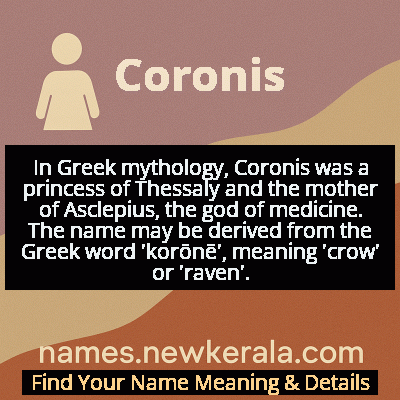Coronis Name Meaning & Details
Origin, Popularity, Numerology Analysis & Name Meaning of Coronis
Discover the origin, meaning, and cultural significance of the name CORONIS. Delve into its historical roots and explore the lasting impact it has had on communities and traditions.
Name
Coronis
Gender
Female
Origin
Greek
Lucky Number
3
Meaning of the Name - Coronis
In Greek mythology, Coronis was a princess of Thessaly and the mother of Asclepius, the god of medicine. The name may be derived from the Greek word 'korōnē', meaning 'crow' or 'raven'.
Coronis - Complete Numerology Analysis
Your Numerology Number
Based on Pythagorean Numerology System
Ruling Planet
Jupiter
Positive Nature
Optimistic, inspirational, and creative.
Negative Traits
Scattered, exaggerating.
Lucky Colours
Yellow, gold, purple.
Lucky Days
Thursday.
Lucky Stones
Yellow sapphire.
Harmony Numbers
1, 2, 9.
Best Suited Professions
Arts, writing, communication.
What People Like About You
Creativity, optimism.
Famous People Named Coronis
Coronis of Thessaly
Mythological Figure
Mother of Asclepius, the Greek god of medicine and healing
Coronis (Nymph)
Mythological Nymph
One of the Hyades nymphs associated with rainfall and nursing of Dionysus
Coronis (Lover of Apollo)
Mythological Princess
Thessalian princess who was transformed into a crow by Athena
Name Variations & International Equivalents
Click on blue names to explore their detailed meanings. Gray names with will be available soon.
Cultural & Historical Significance
The cultural impact of Coronis extends beyond her maternal role to encompass broader themes of transformation and divine intervention. Her name's etymology from 'korōnē' (crow/raven) connects her to Apollo's prophetic birds, creating a symbolic link between prophecy, revelation, and healing. In ancient art, Coronis was sometimes depicted in vase paintings and sculptures, often in scenes showing Apollo's discovery of her infidelity or the rescue of Asclepius from her womb. Her transformation myth also influenced later literary traditions, serving as an archetype for stories about women who undergo metamorphosis. The Coronis narrative demonstrates how Greek mythology often used personal dramas to explain the origins of significant cultural institutions, in this case establishing the divine pedigree for medical practice in the ancient world.
Extended Personality Analysis
Individuals named Coronis typically exhibit a complex blend of intuitive wisdom and transformative resilience. Drawing from their mythological namesake, they often possess strong nurturing qualities combined with independent thinking. These individuals are frequently drawn to healing professions or creative pursuits that allow them to facilitate transformation in others. Their personality tends to be deeply intuitive, with an ability to perceive underlying truths that others might miss—a trait echoing the crow symbolism of their name. Coronis-named people often demonstrate remarkable adaptability, able to navigate challenging circumstances and emerge with new wisdom and strength.
The mythological Coronis's journey from mortal princess to mythological figure suggests that modern bearers of this name may experience significant personal evolution throughout their lives. They often possess a philosophical depth and may be drawn to exploring life's bigger questions. Their association with the medical god Asclepius can manifest as natural healing abilities, whether in physical, emotional, or spiritual realms. These individuals typically value authenticity and may challenge conventional expectations, much like their namesake who followed her own path despite divine consequences. At their best, Coronis-named individuals embody the transformative power that can emerge from difficult experiences, serving as guides who help others find healing and new beginnings after periods of struggle or loss.
Modern Usage & Popularity
In contemporary naming practices, Coronis remains an exceptionally rare choice, primarily selected by parents with specific interests in Greek mythology or classical studies. The name has never ranked in official baby name registries in English-speaking countries, making it one of the more obscure mythological names in modern use. However, it has seen occasional adoption in academic and artistic circles, particularly among families of Greek heritage or those involved in medical professions who appreciate its connection to Asclepius and healing traditions. The recent trend toward unique, meaningful names has brought increased attention to mythological options like Coronis, though its usage remains minimal compared to more popular Greek names like Athena or Daphne. Modern bearers often choose the name for its strong feminine energy, mythological depth, and connection to healing symbolism. The name's rarity ensures it stands out while carrying substantial cultural and historical weight, appealing to parents seeking distinctive names with classical legitimacy and profound meaning.
Symbolic & Spiritual Meanings
The symbolic resonance of Coronis encompasses multiple layers of meaning derived from etymology, mythology, and cultural interpretation. Most fundamentally, the name symbolizes the crow or raven—creatures that in Greek tradition served as messengers of the gods and symbols of prophetic insight. This avian connection positions Coronis as a bridge between divine knowledge and human understanding. The mythological narrative adds deeper symbolic dimensions: Coronis represents the paradoxical relationship between destruction and creation, as her death enables the birth of the healing god Asclepius. She symbolizes the sacrificial mother whose legacy transcends her mortal existence, embodying the concept that profound healing can emerge from profound loss.
Metaphorically, Coronis represents transformation through crisis and the revelation of hidden truths. Her story symbolizes how exposed secrets, while initially destructive, can ultimately lead to greater understanding and new beginnings. The name also carries symbolism related to medical healing and the transmission of knowledge, connecting ancient mythological traditions to modern scientific practice through the enduring symbol of the Rod of Asclepius. In psychological terms, Coronis represents the integration of shadow aspects and the healing that comes from confronting difficult truths. Her transformation into a crow further symbolizes adaptability, intelligence, and the ability to navigate between different realms of existence—making the name Coronis a powerful symbol of resilience, revelation, and regenerative power across multiple interpretive frameworks.

